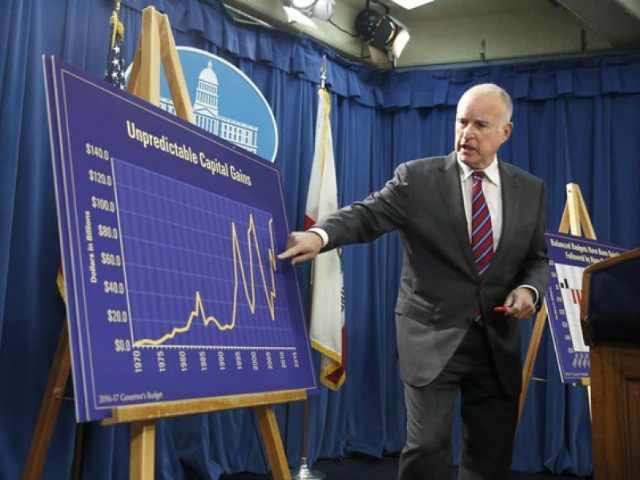Silicon Valley has been enjoying a terrific economic boom, but the current tech-crash and stock market wipeout are already impoverishing the state of California.
The annual “State of the Valley Conference” has been a victory lap each year for Silicon Valley’s corporate, finance, real estate, and political movers and shakers. But with the Bloomberg Silicon Valley High-Tech Index in “bear market” territory after being down over 20 percent for the year, this year’s attendees were suffering some high anxiety.
As the only four counties in California that have seen a full recovery in total employment, unemployment rate, size of the economy, and home values, Silicon Valley’s strength has singlehandedly kept the Golden State solvent. With just 7.7 percent of the state’s population, Silicon Valley has been driving 9.5 percent of jobs, and 10.3 percent of GDP.
The main spark plug for Silicon Valley optimism versus the rest of California has been the ability to book 38.4 percent of “angel” investments, 33.1 percent of venture capital funding, and 43.2 percent of its initial public offerings.
This flood of investors’ cash explains why 47.7 percent of Californian patent registrations were issued to Silicon Valley residents and companies last year. With the pace of innovation accelerating, the U.S. Patent Office opened its 35,000 square foot Western States branch that covers California, Hawaii, Oregon, Washington, Arizona, Alaska, and Nevada in the San Jose City Hall.
The knock-on effect of the 2015 tsunami of outside cash allowed Santa Clara Valley to add 64,000 jobs, San Francisco to gain 30,000 jobs, and Alameda County to book 26,000 jobs. The five counties in the Bay Area added a combined total of 129,000 jobs, according to the Silicon Valley Index. About 37 percent of those new positions were in technology fields.
But despite the glorious headline numbers, Silicon Valley middle-class households with incomes of $35,000-$149,900 actually shrank from 54 percent to 52 percent and low-income households $35,000 or less per year was unchanged at 18 percent.
About 11.3 percent of the population, or more than 800,000 people, in Silicon Valley are in poverty, which is defined by the federal government as an annual income of $11,490 for a one-person household to $23,550 for a family of four.
According to a Silicon Valley Institute analysis, titled “Poverty in the Bay Area,” the despair of poverty is magnified by the region’s sky-high cost of living. The San Jose Business Journal found the average rental cost for a Silicon Valley two-bedroom apartment is now $2,567 a month.
At last year’s ‘State of the Valley Conference,’ a representative of Gov. Jerry Brown touted California as the Best State for Business because “California-based companies surpass their competitors in the U.S. by most measures of performance favored by investors.” At the time, California company stocks, led by Silicon Valley tech, were up 134 percent over four years, beating other states by 23 percent.
But with the Silicon Valley High-Tech Index down over 20 percent since November, and former darlings such as Twitter, Tesla, LinkedIn, and Yelp getting obliterated, nobody at this year’s ‘State of the Valley conference wanted to talk about stocks.
As Breitbart News reported earlier this month, the newest trend in corporate downsizing is hitting Silicon Valley’s former employment “sweet spots.” The latest report by the Challenger, Gray & Christmas, Inc.’s outplacement services found that the third and fourth largest mass layoffs were in the computer and telecommunications industry, which generated 14,375 net pink slips in January.
All this grim news for Silicon Valley should be panic time for the state of California, which has won the Chief Executive.net booby-prize for “The Worst” state to do business, according to its annual survey of 500 CEOs. When Silicon Valley was driving $15 billion in annual capital gains taxes, uber-liberal “Cali” politicians could scoff at the CEO study.
But Breitbart News estimated earlier this month that the 2015-2016 California State Budget did a somersault from a December $1.276 billion surplus to a January $147 million deficit, due to the tax impact of an accelerating slowdown/crash in Silicon Valley.
However, according to the bipartisan Legislative Analysts’ Office, Breitbart News was too optimistic. A revised analysis of the “Big Three” General Fund taxes that include personal income, corporate, and sales tax revealed California plunged to a deficit of $249 million in January.

COMMENTS
Please let us know if you're having issues with commenting.